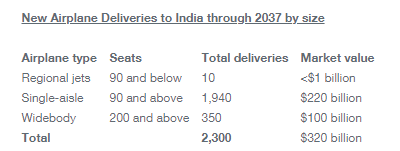Boeing has raised its long-term forecast for commercial aeroplanes in India.
Boeing says “unprecedented domestic passenger traffic” and rapidly expanding low-cost carriers (LCCs) are driving the need for 2,300 new jets – valued at $320 billion (£253 billion) – over the next 20 years.
This year alone, more than 10 million passengers, on average, travelled within India each month, Boeing says.
According to Boeing’s Commercial Market Outlook (CMO), India’s commercial aviation industry has achieved 51 consecutive months of double-digit growth. This growth, it finds, is matched in other sectors of the country’s economy.
Boeing expects the following deliveries in India through to 2037:

Low-cost carriers
“The Indian economy is projected to grow by nearly 350 per cent over the next two decades to become the third largest economy in the world,” said Dinesh Keskar, senior vice president of Sales for Asia Pacific and India, Boeing Commercial Airplanes. “This will continue to drive the growth of India’s middle class and its propensity to travel both domestically and internationally, resulting in the need for more new fuel-efficient short- and long-haul airplanes.”
He added: “To meet this increased domestic air traffic growth, we see the vast majority of available airplane seats coming from LCCs. The success of this market segment will mean more than 80 per cent of all new airplane deliveries in India will be single-aisles. And the superior economics and fuel efficiency of the new 737 MAX airplane will be the perfect choice for Indian carriers.”
Services
With more than five per cent of the world’s fleet expected to operate in India by 2037, Boeing (which has its Boeing Global Services arm) also notes that services, such as flight training, engineering and maintenance and digital analytics, will continue to be a major driver of growth in the region’s commercial aviation industry.
In the South Asian market, including India, Boeing forecasts a commercial services market valued at $430 billion (£340 billion) over the next 20 years.

